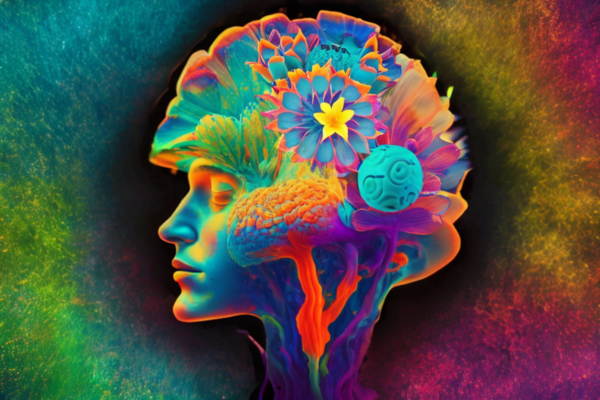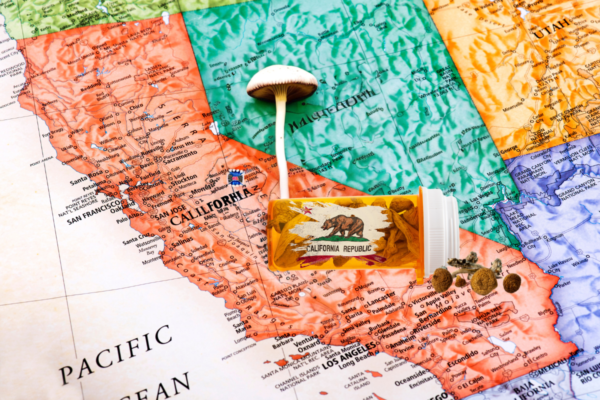
Brushes with the divine are often ineffable, but “Magic Mushroom Rabbi” Ben Gorelick gives gorgeous language to his encounters. “It was everything I always wanted religion to be,” Gorelick says of his second experience with psilocybin. The younger Rabbi Ben had the kind of earth-shattering revelation we all chase. “Oh,” he recalls, “this is what spirituality means. I feel it in my body, I feel it in my heart.”
Gorelick is impressively unfazed for someone facing a felony drug charge. He is the founder of Sacred Tribe, an underground psychedelic synagogue which was daylighted by a police raid in January of this year. Cut to six months later and he’s still trying to gain a religious exemption for charges of possession with intent to manufacture or distribute a controlled substance.
Gorelick’s story has been told and respun with exaggerations and misleads. The story focuses on Rabbi Ben’s mohawk rather than his mysticism, or his small stake in a rave music promotion company rather than his steadfast commitment to thousands of years of tradition. Despite trying to paint him as a novelty, Gorelick claims he is not a mohawked raver masquerading as a Rabbi to skirt the laws and shroom up Denver –– he is a classically educated religious leader exercising a 2300-year-old pillar of Kabbalah.
A Brief History of Entheogenic Use in Judaism
Where the rabbinic tradition is the heady and intellectual spine of Judaism, Kabbalah is the soft heart. And some say that mushrooms have been used to facilitate access to the Kabbalah for millenia.
But Kabbalah neither originated nor owns the role of psychedelics in Judaism. Like many of the world’s oldest religions, Judaism was informed by the ceremonial use of entheogens. Archaeological evidence reports cannabis residue at holy sites in the ancient city of Tel Arad in Israel. Additionally, scholarship points to acacia wood (containing DMT) and a cocktail of other entheogens used in Israelite incense rituals –– not to mention the kaneh-bosm (cannabis) in Christ’s holy anointing oil.
Kabbalah translates to “that which is received.” And to receive, we must be receptive. We must open ourselves to a higher reality where our perception is completely changed, and the divine within all creation –– even the ugliness — are recognized. “The notion that we should only experience ten percent of human emotions to be our higher selves is absurd,” Rabbi Ben says. “If you’re sad, go be guiltlessly, shamelessly sad.”
The entire ethos of religion, some could argue, is to explore mystical and altered states in search of meaning. And this all-emotions-deserved-exploration experience is exactly what Gorelick facilitates. Monthly, Gorelick hosts a weekend-long retreat that creates space for people to explore their “relationship to self, community and God” using psilocybin mushrooms that the team cultivates in Denver. The organizational and spiritual heft behind the ceremonies is exceptional.
Every aspect is calculated and explored through the lens of each congregation member’s individual goals. Gorelick sits down one on one with members to assess their intentions for the night and offers strains in line with those intentions. Though it’s not a guarantee, it aims to help push them in their desired directions. However, no matter the unique course they’d like to chart, the core remains the same. “We’re not here to shoot people to the moon,” Rabbi Ben says. “We’re here to help people connect.”
Why This Trial Matters
How much of the burden is on the Sacred Tribe to prove that they are a religious organization? How much of the onus is on the state of Denver to disprove this? Why is this happening at all when the Religious Freedom Reformation Act is decades old?
The upcoming Colorado November ballot initiative has protections for the criminal and medical-therapeutic sides of psilocybin use. However, Colorado still doesn’t have a process for assessing the religiosity of this trial. They could be concerned with the slippery-slope argument. “[They] don’t want a church of the flying spaghetti monster opening up and allowing people to do heroin,” Rabbi Ben half-jokes. “But these laws have been on the books and haven’t been abused. Religious organizations as a whole have their problems, but abuse of psychedelics isn’t one of them.”
The charges against Gorelick also threaten public interest by pushing psychedelics back underground before residents can vote for themselves on how we might regulate these substances. This is a hugely consequential conversation, and The Sacred Tribe’s outcome will significantly impact the state of religious practices and other communities shifting into the psychedelic space (microdosing moms, athletes). This trial could influence the script not just in Colorado but at a national level— and the Denver District Attorney is very aware of the stakes.
If you would like to help out with The Sacred Tribe’s right to religious freedom, you can find more information at Rabbi Ben’s GoFundMe or Change.org Petition.





